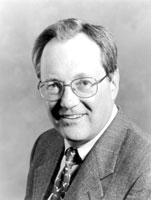|

Approaching
Learning Differences:
Dr.
Mel Levine at Bank Street College of Education
By
Marie Holmes
As
the number of children who are labeled “learning-disabled” and
diagnosed with behavioral disorders such as ADHD seems to be constantly
increasing, parents, educators, and, of course, the students themselves,
are left wondering what these labels mean and how they affect
the classroom dynamic. With the 1997 Individuals with Disabilities
Education Act now up for review, learning disabilities are once
again the center of national debate.
Despite the fact that these labels themselves often prove useless
in helping a student to overcome difficulties, the recent focus
on controversial topics such as Ritalin has heightened awareness
of learning disabilities in general.
It’s not only children with dyslexia or ADHD that struggle with
their personal strengths and weaknesses in the classroom. Maybe
a student understands concepts but has trouble expressing them
in written form, or perhaps he’s unwilling to complete an assignment
simply because he can’t break it down into smaller steps and sees
only the larger picture. “In every classroom there are children
who are marginalized...at different times of the day, in different
subject areas,” explains Clare Wurtzel, Director of the Urban
Schools Attuned professional development program at Bank Street
College of Education.
Urban Schools Attuned is one of several national training sites
for the Schools Attuned program, based on the neuro-developmental
research of Dr. Mel Levine at the University of North Carolina,
Chapel Hill. Dr. Levine is a co-founder of the All Kinds of Minds
Institute, an organization dedicated to the understanding of differences
in learning. Urban Schools Attuned seeks to help teachers understand
and effectively manage learning differences in the classroom,
paying special attention to the concerns of New York City teachers.
Central to the Schools Attuned philosophy is the belief that teachers
and other educators who work directly with students are in the
best position to recognize and manage learning differences. Teachers
use neuro-developmental research to help them understand the various
ways in which students learn, to recognize patterns in students’
learning differences and to use students’ passions and strengths
to overcome their weaknesses. Integration into the classroom is
certainly a goal; however, “we’re not saying that [teachers] have
to do it alone,” explains Wurtzel. “Sometimes they need special
help.”
The workshops are designed to help teachers learn how to make
accurate observations about a student’s learning and then use
these observations to help the student overcome his difficulties.
“What we like to do is label the phenomena, not the student,”
says Wurtzel. “You may need a label to get funding, but that label
doesn’t help you help your student.”
Funding, and the guidelines imposed by the Individuals with Disabilities
Education Act, is not the only factor influencing the trend to
label students as learning disabled. Wurtzel voices the concerns
of many parents, students, and educators when she asks, “Are there
more kids with learning disabilities because we’re checking more?
Or do teachers not have the tools, and label kids, sending them
out of the classroom?”
The program seems to have been successful in helping teachers
manage learning differences. In a national survey, over 80 percent
of past Schools Attuned participants reported enhanced understanding
of student learning and 77 percent felt that they better understood
their students’ behavior. In addition, 20 percent reported that
they stayed in the profession another year as a result of their
Schools Attuned training.
Approximately 500 teachers have attended the Urban Schools Attuned
workshops at Bank Street each year since the program’s inception
in 1998. The Board of Education provides funding for up to four
teachers from each school to receive the training each year, as
well as for on-going support staff within the schools themselves.
Participants receive professional development credit upon completing
the program. Urban Schools Attuned requires that a minimum of
three teachers from a school attend the training, so that each
will be able to receive on-going support, and in hopes that the
complex language of learning differences, as opposed to the stark
labels of learning disabilities, becomes a way of talking about
children in the school.#
Education Update, Inc., P.O. Box 20005, New York, NY 10001. Tel:
(212) 481-5519. Fax: (212) 481-3919. Email: ednews1@aol.com.
All material is copyrighted and may not be printed without express consent of
the publisher. © 2001.
|

